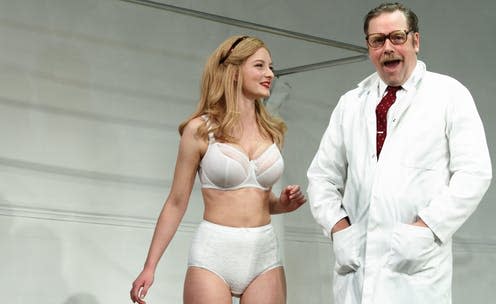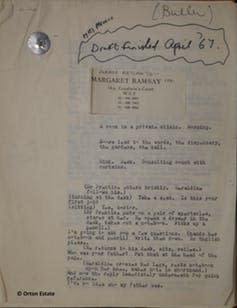What the Butler Saw: Joe Orton's savage satire on rape is as relevant now as it was in 1969

Condemned when it opened in 1969 as “vulgar”, “sordid” and “sick” for its provocative blend of the comic and the macabre, Joe Orton’s irreverent black comedy What the Butler Saw now seems less controversial in all ways except one: its humorous treatment of rape and sexual assault. Following feminist analyses of sexual violence since the 1970s, Orton’s final play has been increasingly condemned as outdated and offensive, even misogynistic.
But despite the apparently glib references to rape that run through the play, Orton thoughtfully uses this theme to amplify his central concerns: hypocrisy, corruption and the limits of the sexual revolution.
Now, 50 years after its premiere, What the Butler Saw deserves to be recognised as a play in tune with today’s #MeToo and #TimesUp movements in its excoriating satire on a society that elides, minimises, normalises and even romanticises rape. That people fail to see this indicates the persistence of attitudes lampooned in the play.
Set in a psychiatric clinic, Butler exposes the monstrous misconduct of two doctors, Prentice and Rance. The title suggests a saucy sex comedy through allusion to the seaside slot machines that permitted a viewer to furtively watch a woman undress, like a butler peering through the keyhole of a bedroom door. At the same time, the title implies a working-class view of the upper class.
As a working-class queer, Orton’s outsider perspective is evident in the way he spoofed mainstream sex comedies, epitomised by films such as Carry On Nurse (1959) and Carry on Doctor (1967), subverting the social and sexual norms they upheld.
In denial
What the Butler Saw opens with an attempted rape. While interviewing Geraldine Barclay for the position of secretary, Dr Prentice persuades the young woman to disrobe on the pretext that he wishes to confirm her physical fitness for the job. As his names suggests, Prentice attempts rape by pretence, a crime recognised by the Sexual Offences Act (1956), which criminalised the procurement of sex by deception. He practices a further deception when he employs euphemism to pass off sexual coercion as seduction.
The same discursive strategy is deployed to deny his rape of his wife years before when working as a chambermaid. Mrs Prentice plainly states: “I was raped in a linen cupboard on the second floor of the Station Hotel” – yet her husband recalls that he “debauched” her. Prentice even romanticises his behaviour to avoid recognising it as rape. He describes his attempt to “seduce” Geraldine as a story “concerned solely with the heart” and sentimentalises the rape of his wife as “a moment that was very precious to me”. Orton thus ridicules the language of elision that enables Prentice to see himself as a “decent citizen” rather than a serial sexual predator.
Prentice is not the only sex offender in the play. Nick, the page boy at the Station Hotel, admits his attempted rape of Mrs Prentice the night before and “misconducts” himself with a group of schoolgirls, while police officers subject women to “acts of indecency”. By making sexual assault widespread and routine throughout the play, Orton derides a society that professes to regard rape as repugnant but refuses to take it seriously as a crime.
The play challenges prevailing ideas about why men rape and the kind of men who do. Prentice is driven less by uncontrollable sexual urges than a lust for power – he renders his authority indisputable, telling Geraldine: “Never ask questions,” and – in the stage directions – he observes her remove her underwear with a “superior” smile.
Perfectly normal
Addressing fears of so-called “stranger danger”, Orton suggests that rapists are not aberrant monsters but ordinary men known to the women they abuse. As Prentice states: “I’m a perfectly normal man.”

The play also upends common assumptions about the relationship between delinquency and social class. Prentice is a “gentleman”, a “respected member” of his profession with an OBE – and a man guilty of sex crimes. Even Sir Winston Churchill, beloved national icon, is reduced from war hero to rapist when Geraldine’s stepmother is “violated” by “parts” of his statue left “‘embedded” in her by a gas explosion.
Labelling his wife a nymphomaniac (“You were born with your legs apart. They’ll send you to the grave in a Y-shaped coffin”), Prentice assumes she relishes sexual violation:
Prentice: A man exposed himself to you last Summer.
Mrs Prentice: I didn’t see anything.
Prentice: And your disappointment marred our holiday.
Rance uses Mrs Prentice’s “depraved sexual appetites” to dismiss her charge of attempted rape by Nick as “a fabrication of her diseased mind”. The doctors endorse his attempt to explain his way out of it: she imagined it, she asked for it, she enjoyed it. But this delusion and dishonesty simply serves to undermine their own credibility. Through their increasingly perverse behaviour, both men appear ridiculous, even mad.
Orton uses laughter not to trivialise rape – but to deflate the power of rapists and rape myths. The persistence of these myths indicates that, rather than being dated and redundant, his comedy remains sadly relevant today.
This article is republished from The Conversation under a Creative Commons license. Read the original article.

Emma Parker has received funding from the Arts Council England for work on Joe Orton in 2017. She will also chair a panel discussion about the play at the British Library, at 7pm on April 23 April with panelists Julia Foster, Timothy West, John Tillinger and Nikolai Foster: https://www.bl.uk/events/joe-orton-what-the-butler-saw

 Yahoo News
Yahoo News 
